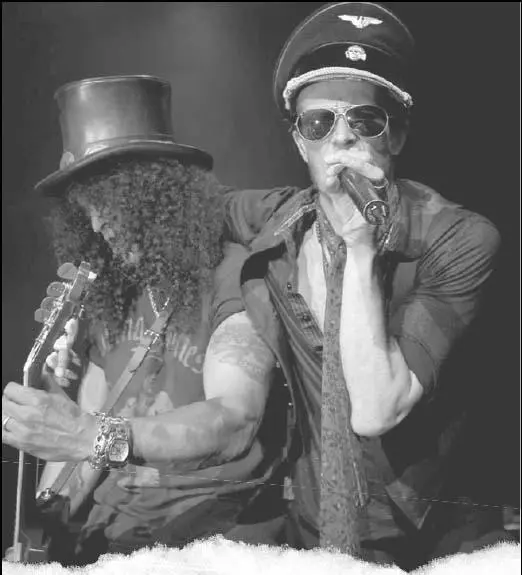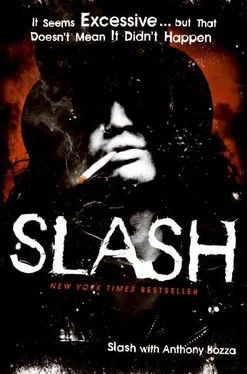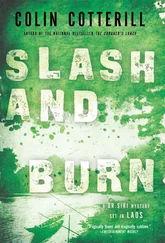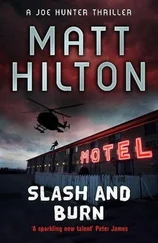Most of them were so bad that we assumed that they were taking the piss… but we were never quite sure. Too many were like some guy in Wyoming who lived in a garage sending us his very best imitation of Guns. There were too many tapes by singers who just loved Guns to an unhealthy degree. I wanted to ask a lot of them if they’d actually listened to what they had sent us or at least played it for someone else before they sent it, and if they had what that person thought of it.
There were endless examples of guys doing really bad versions of “Welcome to the Jungle”; there were too many people who considered themselves poets submitting dramatic lyrics on a variety of subjects. We got folksingers, we got thrash-metal singers, we got people who sent us recordings that were so poor that I swear to God they must have recorded them on the mike in their boom box.
I was driving through North Hollywood one day thinking about how strange this process was. At the same time I thought that it should be documented, because I knew that it was going somewhere. I thought that I should talk to my friend Eric Luftglass, a producer at VH1 about it, but literally before that thought got more mature, he called me.
“Hey Slash, Eric Luftglass. I hear that you and Duff and Matt are putting together a band and looking for a singer,” he said.
“Yeah, do you know anyone?” I said.
“That’s funny! No, but I wanted to know if you’d be interested in having us document your search for a VH1 special. It would be a great launchpad for the band. Hey, do you guys have a name?”
“No, we haven’t gotten there yet. We’re still stuck on the singer part. But wait, I swear, I was just thinking that I should call you to let you know about all of this.”
Eric sent a pair of camera guys down to Mates and we weren’t sure about how it would work. We decided to reserve judgment until we met them. They were both named Alex and they’d recently shot the Aerosmith episode of Behind the Music, which I’d enjoyed. We started hanging out with them and it was cool; they started to get casual behind-the-scenes footage of us. We had gotten some interesting demos that were pretty good; most of them were done with talented singers who were just not the right style for what we were looking for but they were good nonetheless. I estimate that one out of every two hundred demos we listened to was someone that intrigued us enough to have them come in to the studio. One of those was this guy named Steve from England who was pretty good. He was in a band called Little Hell, but I might be wrong about that. His band was almost punk rock with lots of attitude and sarcasm in the lyrics. We had him come out and he ended up on our VH1 special but nothing happened as far as his joining the band.
By this time about eight months had gone by since we decided to do this thing and we were starting to get weathered. It didn’t help much when some bigwig at VH1 who had seen the footage of our show came down to the studio to tell us to “turn up the drama.” The reality of us behind the scenes apparently wasn’t cutting it, so we fought with the producers from that point on. In the end, the footage they captured of a few of the singers was made to look way more dramatic than it actually was. Unfortunately, our time with Sebastian Bach became the main theme of that program.
Among the professional singers we knew, Ian Astbury of the Cult came down to check out what we were doing (off camera); Sebastian Bach was also a contender, but that was never really considered as a possibility. We rehearsed with Sebastian for a while and even had him come into the studio to put vocals on a few tracks. At the time he was singing in a production of Jesus Christ Superstar and it was great to see this whole new professional side of Sebastian. Nonetheless, it didn’t work out; it sounded too much like the sum of our parts, not like anything new—it was Skid Roses.
And throughout it all, Scott Weiland’s name kept coming up. Everyone in the band knew him one way or another, except for me. Dave had been in a band called Electric Love Hog that had opened for STP, and Matt had been in rehab with Scott. Duff’s wife, Susan, was friends with Scott’s wife, Mary. I just thought he was a great singer, and he’d always been on my mind for this band. He was the one vocalist that I knew had the kind of voice that would serve what we were going to do: he had a John Lennon-ish quality, a little bit of Jim Morrison, and a touch of almost David Bowie. He was the best singer to come out in a long time in my opinion.
Since everyone else knew him, I told Duff to call him up. He did and he asked Scott if he’d like to hear some of our demos. Scott was into it, so we got four tracks together, got them recorded, and I brought them down personally to his apartment. At the time he was living on Blackburn, ironically, just a few doors down from where I’d lived with my dad for a while when I was a kid. That night he was doing a show with STP, so I left the CD on his doorstep and the rest of us waited eagerly for his call.
A week later he called us, and as positive as he was about the music and what he thought we were doing, he was honest about the fact that STP was still together. They were having their problems, but Scott was straightforward about the fact that he intended to stick it out and see where it was going.
“Listen,” I said. “I don’t want to try to drive a wedge between you and your band.”
We left it at that. And Duff, Matt, Dave, and I went back to the tape pile…
WE ENLISTED THE ASSISTANCE OF MY old attorney, turned manager, Dave Codikow in our quest. It’s a good thing we did, because as it continued to go nowhere, a few months later, David let us know that Stone Temple Pilots had broken up. I was happy to hear it—for entirely selfish reasons. I didn’t really care about being polite; I asked Duff to call Scott right away to ask him if he was interested in coming down and checking us out.
We had just written the music to “Set Me Free,” and we gave Scott the demo, asked him to listen to it and, if he liked it, to come by and see us rehearse—no pressure. He kept the track for a week, in which time he took it into his own studio and put a vocal track on it. At the time we were very much seeking him out, while Scott was trying to map out a plan for himself. He was unsure if what we had going on was right for him, but when we heard his vocal for that track, we knew that it was exactly what we’d been looking for: what he did was far beyond anything I’d imagined for that song. He took to another level; it sounded different and better than anything we’d done up to that point. I’ve never asked Scott how he felt after he’d recorded those lyrics… all I know is that the rest of us were excited as hell. And I got the feeling he was, too.
Scott delivered the track himself that day; he came walking into Mates wearing one of those fisherman’s hats pulled way down over his eyes and one of those surfer sweaters with a hood and two-sided pocket in the front. The door of our rehearsal room was about two hundred feet from the stage we were on, but even at that distance, as low profile as he was, he had an amazing presence that struck me immediately. When he came up onstage to say hello, it felt like I’d known him for a very long time. We got to talking, we listened to the demo he’d made, and it seemed like we were reconvening more than starting anew.
SCOTT’S VOCAL SOLD US. WE WERE TOTALLY committed; it brought together all of the elements that we’d been working on. The only problem was that he wasn’t sure he wanted to join our band. He was thinking about recording another solo record and he also had some personal issues that he was trying to sort out.

Slash and Scott belting it out at the Avalon Ballroom in Hollywood in May 2007.
David Codikow, who with Dana Define had gone to work at Immortal as a management team, took an active interest in us and set up a showcase for the industry down at Mates. We performed just one song: “Set Me Free.” Our audience was made up of music producers, musical directors, and music coordinators from the big movie studios. Tom Zutaut was there, too—it was sort of like old times.
Читать дальше
Конец ознакомительного отрывка
Купить книгу





![Сол Слэш Хадсон - Slash. Демоны рок-н-ролла в моей голове [litres]](/books/387912/sol-slesh-hadson-slash-demony-rok-n-thumb.webp)


